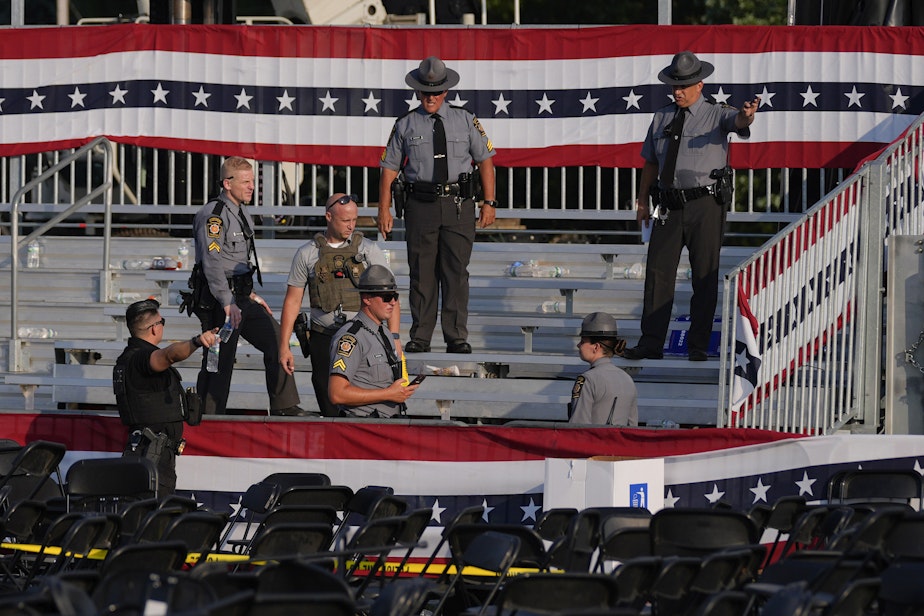The Trump assassination attempt and why domestic terrorism is hard to combat in the U.S.

This essay was adapted from an interview with Soundside host Libby Denkmann.
Over the past 15 years or so, we have seen a rise in domestic terrorism in the U.S. that's primarily been far-right violence, white supremacist, and anti-government violence that has predominantly targeted minority communities.
Some of the incidents that we think of as domestic terrorist attacks include the Charleston, South Carolina, shooting; the Pittsburgh, Pennsylvania, synagogue shooting; the El Paso, Texas, Walmart shooting; the Buffalo, New York, Tops Friendly supermarket shootings.
We've also seen left-wing violence. But when you're looking at the lethal side of it, that has primarily targeted politicians – the 2017 shooting of the Republican team baseball practice, and in 2022, Supreme Court Justice Brett Kavanaugh had an armed threat at his house.
Counterterrorism analysts tend to assess threats as an equation of three things: intent, capability, and opportunity.
Sponsored
Part of the reason why counterterrorism is so difficult in the U.S., is because capability is never in question. You always have capability, because you always have access to firearms. That means from a counterterrorism standpoint, you have to tackle the other two things. For intent, that often means you have to get inside somebody's head to try to figure out if they're plotting an act or not.
And you have to combat opportunity. That is where the Secret Service failed so spectacularly on Saturday. They allowed a window of opportunity for somebody to conduct an attack.
This is why counterterrorism is so difficult. In other Western countries, let's say in Europe, the number one counterterrorism policy they have is arms control. We do not have that in the United States, which means from a counterterrorism standpoint, you are always starting your investigation from a losing position.
Because whoever the individual is, whatever their intent is, whatever their opportunities will be, they will have the capability, and that is very challenging.
I've been concerned throughout the election cycle by politicians on both sides freely saying that if we don't win this election, this will be the last election we have in this country. They're doing this to create urgency among the base and turn out voting, but the line between somebody voting because they're existentially afraid, and turning to violence because they're existentially afraid, is razor thin.
Sponsored
There is also a broader normalization of violence in this country. Consider January 6, where you had a terrorist attack on the U.S. Capitol, and an assassination attempt on the vice president. And still, three and a half years later, we have an entire side of our political system that claims those individuals are political prisoners, martyrs, heroes, warriors. That is lowering the barriers to entry to violence in this country, whether this latest incident is political or not. It is making violence more palatable, and more realistic for people.
The fact is that we had over 100 police officers who were wounded. We have certain individuals who are facing long prison sentences for seditious conspiracy, arguably the most serious crime in the United States – intent to overthrow the government, the classic example of terrorism. These people have faced felony charges at the federal level, and yet that is still being undermined by politicians.
The other case study here that I think is important to look at, rhetoric-wise, is the October 2022 assassination attempt on the Speaker of the House, Nancy Pelosi, where an individual broke into her home in San Francisco and gravely wounded her husband.
There was a narrative that emerged afterwards, prominently shared by high-profile figures on the right, including Elon Musk, who has now endorsed former President Trump, claiming that was somehow a homosexual affair gone wrong – dehumanizing both the Pelosi family and gay people across America.
The question that historians will one day be able to answer is, was this incident on July 13, 2024, the end of political violence in this election cycle or the middle of it? It was not the start. I think we're going to need more details on this case. Because fortunately, or unfortunately, people are going to determine how strongly they should feel based on the motive of this individual.
Sponsored
We're at an elevated threat environment right now. It's quite a frightening moment in our country.
Jacob Ware is a research fellow at the Council on Foreign Relations where he studies domestic terrorism and political violence. He's also co-author of God, Guns and Sedition, Far-Right Terrorism in America.
This essay was adapted from a transcript of an interview with Soundside’s Libby Denkmann on July 15, 2024. It was lightly edited for clarity.




